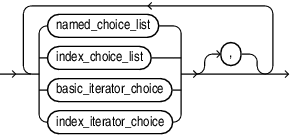14.52 Qualified Expression
Using qualified expressions, you can declare and define a complex value in a compact form where the value is needed.
Topics
Syntax
qualified_expression ::=
typemark ::=
type_name ::=
aggregate ::=
positional_choice_list ::=
sequence_iterator_choice ::=
explicit_choice_list ::=
named_choice_list ::=
indexed_choice_list ::=
Semantics
qualified_expression
Qualified expressions for RECORD types are allowed in any context where an expression of RECORD type is allowed.
Qualified expressions for associative array types are allowed in any context where an expression of associative array type is allowed.
typemark ( aggregate )
Specifies explicitly the type of the aggregate (qualified items).
typemark
type_name
Qualified expressions use an explicit type indication to provide the type of the qualified item. This explicit indication is known as a typemark.
[identifier . ]identifier
Indicates the type of the qualified item.
aggregate
A qualified expression combines expression elements to create values of aRECORD type, or associative array type.
positional_choice_list
expr [ , ]
Positional association is allowed for qualified expressions of RECORD type.
A positional association may not follow a named association in the same construct (and vice versa).
sequence_iterator_choice
FOR iterator SEQUENCE => expr
The sequence iterator choice association is a positional argument and may be intermixed freely with other positional arguments. All positional arguments must precede any non-positional arguments. Sequence iteration is not allowed for INDEX BY VARCHAR2 arrays.
explicit_choice_list
named_choice_list | indexed_choice_list | basic_iterator_choice | index_iterator_choice
Named choices must use names of fields from the qualifying structure type. Index key values must be compatible with the index type for the qualifying vector type.
named_choice_list
A named choice applies only to structured types
identifier => expr [ , ]
Named association is allowed for qualified expressions of RECORD type.
indexed_choice_list
An index choice applies only to vector types.
expr => expr [ , ]
Indexed choices (key-value pairs) is allowed for qualified expressions of associative array types. Both the key and the value may be expressions.
Using NULL as an index key value is not permitted with associative array type constructs.
basic_iterator_choice
FOR iterator => expr
The basic iterator choice association uses the iterand as an index.
Restrictions:
The PAIRS OF iteration control may not be used with the basic iterator choice association.
index_iterator_choice
FOR iterator INDEX expr => expr
The index iterator choice association provides an index expression along with the value expression.
Examples
- Assigning Values to RECORD Type Variables Using Qualified Expressions, "Assigning Values to RECORD Type Variables Using Qualified Expressions"
- Example 6-11, "Assigning Values to Associative Array Type Variables Using Qualified Expressions"
- Example 6-8, "Basic Iterator Choice Association in Qualified Expressions"
- Example 6-9, "Index Iterator Choice Association in Qualified Expressions"
- Example 6-10, "Sequence Iterator Choice Association in Qualified Expressions"
- Example 5-26, "Using Dynamic SQL As An Iteration In A Qualified Expression"
Related Topics
-
"Qualified Expressions Overview" for more conceptual information and examples
- Assigning Values to Collection Variables
- Assigning Values to Record Variables










